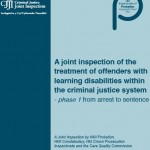
Background
We know that people with learning disabilities in the criminal justice system can be especially vulnerable, and the recent Bradley report highlighted a number of approaches that could be taken to prevent this vulnerable group being caught in the revolving door of the criminal justice system.
It is unclear however how many people with learning disabilities might be in the system as a result of no clear agreement across agencies about definitions.
Method
A report of a joint inspection of the treatment of offenders with learning disabilities has now just been published, looking at what happens to people from arrest to sentence. The inspection team looked at what happened in police stations, through the process of prosecution and into the courts, pre-sentence report preparation and the assessment and planning undertaken at the start of a community order.
Results
What they found was
- poor screening at the police arrest stage
- lack of training for medical or psychiatric professionals
- focus on the learning disability meant the individual was often ‘lost’ in the process
- offenders with learning disabilities were not receiving support they required to reduce risk of harm to others or likelihood of reoffending
- appropriate adults were not always available
- only one police force had access to a diversion scheme for offenders before arrest
- some areas had diversion schemes within the court building rather than before
- in two-thirds of cases the Crown Prosecution Service (CPS) was not provided with information regarding the offender’s learning disability
- pre-sentence reports were not always based on an appropriate risk/needs assessment
The authors point out that Bradley recommended intervention at the police stage in the offender pathway as the best opportunity to effect change, but this inspection report suggests that this has yet to be implemented.
Conclusion
The authors conclude that “At all points in the criminal justice process, up to and including the point of sentence the treatment of people with learning difficulties could be significantly improved,” including identification of a learning disability, sharing that information appropriately and taking account of the nature and effect an offender’s learning disability may have had, on their offending.
The report authors make a number of recommendations for Police forces and the Crown Prosecution Service, the Department of Health and NHS England (Health and Justice), HM Courts and Tribunals Service, Probation Trusts and the Ministry of Justice to ensure that all agencies concerned understand the offending and support-related needs of offenders with learning disabilities
Link
A Joint Inspection by HMI Probation, HMI Constabulary, HM Crown Prosecution Inspectorate and the Care Quality Commission


In the news: Needs of people with learning disabilities in criminal justice system not being met http://t.co/NvaCS54BKM
Needs of people with learning disabilities in criminal justice system not being met – The… http://t.co/U3NM6DK3tD